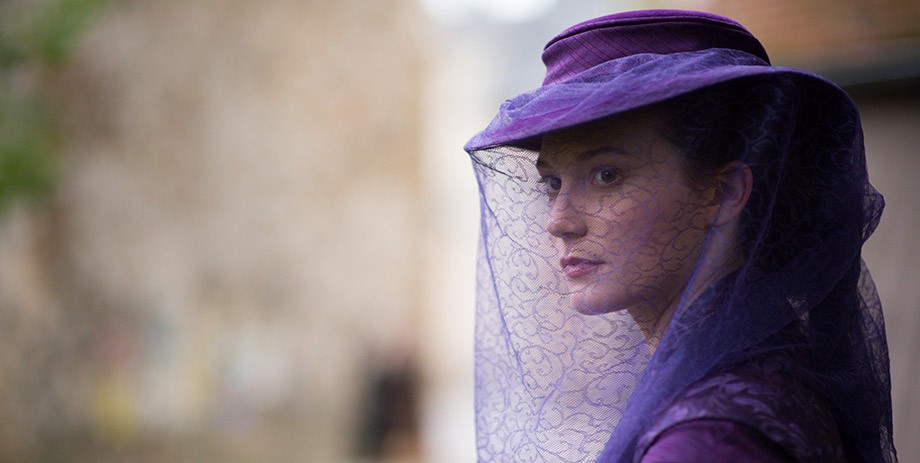A Columbia University graduate, Sophie Barthes was born in France and grew up in the Middle East and South America. Barthes has just completed an English adaptation of Gustave Flaubert’s Madame Bovary with Mia Wasikoswka, Rhys Ifans, Paul Giamatti and Ezra Miller. In 2010, her directorial feature-film debut, Cold Souls with Paul Giamatti and Emily Watson, was released in the US by Samuel Goldwyn, and was also distributed worldwide. Prior to its theatrical release, Cold Souls played in competition at the 2009 Sundance Film Festival and went on to play in more than thirty international film festivals
Barthes has completed a residency at the Sundance Screenwriters & Directors Lab and was named one of Filmmaker Magazine’s “25 New Faces of Independent Film.” She is a recipient of the Annenberg Foundation Film Fellowship. (Press materials)
Madame Bovary will play at the Toronto International Film Festival on September 10, 11, and 12.
WaH: Please give us your own description of the film.
SB: It’s an adaptation of Madame Bovary. My intention was to respect the spirit of Flaubert’s novel, to honor his acute sense of aesthetics and beauty (through costumes and production design), while creating a modern film in terms of style, acting, cinematography, editing, and music.
WaH: What drew you to Flaubert’s novel?
SB: Madame Bovary is one my favorite novels. Emma Bovary will always be an enigma, but as the years pass, I feel that I understand her better. She has a violent nostalgia, almost an infantile nostalgia, to be understood by the men surrounding her. I like her relentless fight for independence, her rebellion against the mediocre, and her quest for the sublime, even if she burns her wigs in the process. I like that Flaubert never judges her morally for her self-destructiveness, for her desperate attempt to satisfy her wildest desires and appetites.
As Baudelaire said it so beautifully, Emma Bovary is an androgynous character. She cannot be reduced to a gender or a sociological type. She represents something bigger than herself. That was the genius of Flaubert: the ability to combine the general and the particular.
WaH: What was the biggest challenge in making the film?
SB: Making this film has been Sisyphean. It was difficult to put the financing together. But the whole team [did] incredible [work], and I think it paid off. I had a very precise idea of how I wanted this film to look and feel, which required shooting in a specific region in France, collaborating with French heads of departments for costumes and production design to recreate the 19th-century provincial France as authentically as possible to honor Flaubert’s memory.
WaH: What do you want people to think about when they are leaving the theatre?
SB: More than “think,” I would like them to leave the theater with a feeling, an emotion. I also hope that they would want to rediscover or read the novel for the first time. Madame Bovary is timeless. It is not just about the female condition in France in the 1840s. It’s not a simple cautionary tale. Emma is more than a character; she gives us an insight into human nature. With Emma, we are diving into the complexities of Flaubert’s psyche. I think that Flaubert’s famous sentence, “Madame Bovary, c’est moi” (“Madame Bovary, she is me”), in reality means, “ Madame Bovary, c’est nous” (“Madame Bovary, she is us”), in our modern incapacity to live a “good-enough” life.
WaH: What advice do you have for other female directors?
SB: Never give up. I do believe it is harder for female directors. I have been lucky to receive support from the Sundance Institute for my first film. I’m eternally grateful for their support. I think you need to be surrounded artistically and follow your intuition — always follow your intuition.
WaH: What’s the biggest misconception about you and your work?
SB: I have no idea. I’ve only made short films and two features, which are very different. One is a surreal comedy, and the other is a period tragedy. I’m curious to know what misconceptions this could trigger.
WaH: How did you get your film funded? Share some insights to how you got the film made.
SB: European funds. It’s an independent film, so the financing is largely dependent on the prestige of the cast and foreign sales.
WaH: Name your favorite women directed film and why.
I love Cléo from 5 to 7 by Agnes Varda. I love its simplicity, tonality, poetry, atmosphere, sensuality, lightness, and sadness. I also admire the work of Claire Denis and Vera Chytilova.







